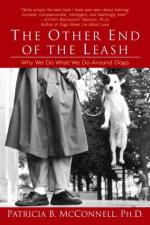
|
| Name: _________________________ | Period: ___________________ |
This test consists of 15 multiple choice questions and 5 short answer questions.
Multiple Choice Questions
1. McConnell states that what is contrary to a dog's nature?
(a) Exercising them too much.
(b) Cooping them up all day.
(c) Feeding them twice a day.
(d) Putting them in a kennel.
2. According to McConnell, what is NOT a reliable indicator of personality?
(a) The breed.
(b) The dog's.
(c) The father's.
(d) The mother's.
3. Who are the betas in a social hierarchy?
(a) They are the leaders who wish to give up their position.
(b) The are the followers who are content with their position.
(c) They are the status seekers who wish to improve their position.
(d) They are the followers who were once leaders.
4. According to McConnell, what should an owner NOT assume about petting her or his dog?
(a) That the dog wants to be petted.
(b) That the dog does not want to be petted.
(c) That others want to pet the dog.
(d) That others do not want to pet the dog.
5. What should an owner do if the dog persists in an unwanted behavior?
(a) Grab the dog by the collar and make eye contact.
(b) Turn towards the dog and make eye contact.
(c) Turn away from the dog and avoid eye contact.
(d) Grab the dog by the scruff of the neck and avoid eye contact.
6. According to McConnell, why is social structure NOT as important to dogs as many might think?
(a) Because dogs are like juvenile wolves, who have less social structure.
(b) Because dogs are like adult foxes, who have less social structure.
(c) Because dogs are not like juvenile wolves and juvenile coyotes, who have more social structure.
(d) Because dogs are not like wolves, coyotes, or foxes, who have more social structure.
7. What does "ventral-ventral contact" mean?
(a) Hugging.
(b) Kissing.
(c) Physical closeness.
(d) Eye contact.
8. According to McConnell, much of a dog's behavior has to do with what is _______versus what is _______.
(a) Familiar; unfamiliar.
(b) real; fake.
(c) Appealing; unappealing.
(d) Safe; dangerous.
9. What are show dogs typically bred for?
(a) Personality.
(b) Physical traits.
(c) Work.
(d) Leisure.
10. What does McConnell believe about how the majority of prospective owners base their decision to adopt or buy a dog on?
(a) She supports it.
(b) She supports certain breeds.
(c) She doesn't support certain breeds.
(d) She doesn't support it.
11. How important are physical traits in choosing a dog for McConnell?
(a) Not important.
(b) Important for men.
(c) Very important.
(d) Important for women.
12. Besides giving a dog a command to wait at the door, what else does McConnell suggest an owner do?
(a) Say No.
(b) Clap your hands.
(c) Hold the dog.
(d) Use a body block.
13. What is the example of "group bereavement" Andy Beck observed?
(a) A pack of wolves who stood in a cricle and faced dead pups.
(b) A herd of horses who stood in a circle and faced dead foals.
(c) A school of dolphins who swam in a circle around dead calves.
(d) A herd of elephants who stood in a circle around dead calves.
14. What is one claim owners make about their dog's personality that is erroneous, according to McConnell?
(a) "But he doesn't like treats!"
(b) "But he can't be trained!"
(c) "But he never acts this way at home!"
(d) "But he acts different in new environments!"
15. What does McConnell liken a death of a pet to?
(a) A responsibility to bear.
(b) A time of renewal.
(c) An opportunity to adopt.
(d) A death of a loved one.
Short Answer Questions
1. Why is it important to ask a breeder about a dog's lineage?
2. What choice should humans make in regard to how they treat dogs, according to McConnell?
3. Why is the phenomenon McConnell discusses regarding death so poorly understood?
4. Who does NOT display affection by "ventral-ventral contact"
5. What is an "alpha rollover"?
|
This section contains 737 words (approx. 3 pages at 300 words per page) |

|




